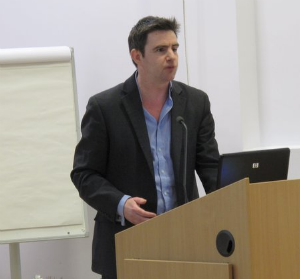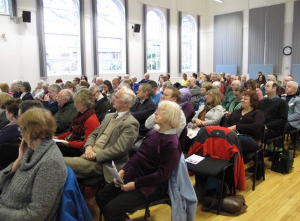More than a hundred people gathered in York on 31 January to attend
Truth, Lies and the Spirit Level: Poverty and Inequality in Britain Today, a free day conference organised for Poverty and Homelessness Action Week. The diverse crowd included clergy of many denominations, lay people, front-line workers in homelessness, prisons and drug-abuse, local politicians, students and concerned members of the public.

This event brought together Kate Pickett, Professor of Epidemiology at the University of York and co-author of
The Spirit Level: Why More Equal Societies Almost Always do Better and Paul Morrison (pictured) of the
Joint Public Issues Team, author of
The Lies We Tell Ourselves: ending comfortable myths about poverty – known as the
Truth & Lies Report for short.
Joining them on the platform were Jonathan Bradshaw, Professor of Social Policy at the University of York and Trustee of the Child Poverty Action Group, who spoke about austerity and the impact of the recession on child poverty, and Dr Paul Edmondson-Jones, deputy Chief Executive and Director of Health at City of York Council (CYC), who explained what factors influenced health inequalities and talked through some of the policies being implemented by CYC following its resolution to become a poverty-free city last year. In the Chair was The Very Reverend Vivienne Faull, Dean of York.
Jonathan Bradshaw spoke first with a talk which he unashamedly described as “a rant”, but which laid out the effects of current Government policies which, he said, protect pensioners at the expense of their children and grandchildren. He reminded us of the world as it was before the recession, with improvements across the board in education, health, child care, housing quality and neighbourhoods and inequality stabilised. He pointed out that following the banking crisis in 2007, the then Labour Government adopted a broadly redistributive approach and the economy was actually growing again by 2010.
He then painted a graphic picture of the world since the last election, with the aspiration of the austerity regime to reduce the deficit (£81 billion) by 2014. Crucially, little of this shortfall was to come from increased taxation; the vast majority (around 85 per cent now) has come instead from cuts in services and benefits.
The results include mass unemployment (currently 2.3 million), 18 per cent youth unemployment, £3.8bn real term cuts to working age benefits, a rise in absolute child poverty (2 per cent up in 2011/12 alone) and falling living standards all round. Whilst there are more jobs around than there were a year ago, these jobs do not pay sufficient to get people out of poverty. Depressingly, if not shamefully, 67 per cent of poor children now live in working households.
At the same time there has been a sustained attack on the definition of poverty and a flagrant abuse of statistics. Professor Bradshaw painted a grim picture of cuts yet to come - things will only get worse as the need for front-line services grows even as they are cut to the bone. And whilst the rich do pay more in tax than the poor, our current system is so regressive that when indirect taxes such as VAT are taken into account, it is clear that the poorest pay relatively far more in tax than the rich, losing about 43 per cent of their gross income in tax as against the richest decile’s 35 per cent. Meanwhile there has been a £28bn giveaway in taxes on fuel, alcohol and corporation tax, not to mention the abolition of the 50 per cent tax rate.
Next up was Paul Morrison, who told us that if Professor Bradshaw had given us a rant, he was going to make us livid! He started by reminding us that way back in 1753 John Wesley, the founder of Methodism, said, “So wickedly, devilishly false is that common objection, ‘They are poor, only because they are idle’.”
Yet that false objection is still common currency more than 250 years later and it’s no more true now than it was back then.
Paul ran through the half-dozen myths about benefit claimants contained in the Truth & Lies Report. As he said, these are by no means the only myths, but they are some of the most common. They include the myths that “they are all on drink and drugs” and “they have enough money, they just can’t manage it properly”. He showed how there was no evidence to back up these lies and how in fact, the evidence pointed the other way.
On the myth that “they are all on the fiddle”, Paul told us that whilst benefit fraud runs at between 0.7 per cent and 0.9 per cent, tax fraud runs at 4-6 per cent. As Paul pointed out, headlines SHOULD read, “Benefits claimants are much more honest than average”. But headlines like these don’t sell papers!

He also exploded the myth about “three generations of worklessness”. Apparently there is no evidence whatsoever to back up this claim. Government ministers, challenged to produce the figures, tend to prevaricate and merely claim to have met such families on their travels. Asked – and Paul Morrison has asked several times – who these families are, he gets no replies at all. It’s hard enough being poor without having lies spread about you in the press and coming out of the mouths of Government ministers.
As Paul pointed out, if such things were said about people in society with money and thus power, they wouldn’t get very far. But the poor have no voice, no money, no power. They can be lied about with impunity.
Dr Paul Edmondson-Jones followed with a practical case-study borne out of York’s resolution in 2013 to become a poverty-free city. York, he told us, was a relatively affluent city, with unemployment so low as to be negligible compared to the national and regional average.
Nevertheless, the data showed that the rich live longer lives and whilst poor women in York live just a few years shorter than those of their richer sisters, the bottom 10 per cent of men had much lower life expectancy and the City authorities were looking at ways of addressing this. York has also implemented the Living Wage for all its employees; given office space to the South Yorkshire Credit Union to help people avoid using loan-sharks; boosted take-up of free school meals and is developing a group purchase of fuel to cut energy prices for poorer residents.
After lunch, Kate Pickett gave a lively and sometimes very funny talk on inequality and how more equal societies do better for all their citizens. Using material so new it has not yet been published as well as significant material from
The Spirit Level Kate established how inequality affects a whole range of issues across society, from teenage pregnancy to rates of imprisonment, mental health issues to obesity.
She also explained how, oddly, people in more unequal societies such as the USA often “big themselves up” and claim they are doing better than they really are. They claim to be extremely healthy even when their life expectancy is way below that of people in other countries (such as Japan) where people live longest but claim to have average or below-average health. It’s not that the Japanese are a nation of hypochondriacs, more that in the USA people are terrified of being “have-nots” as the gulf between the rich and the poor is so extreme. There’s an issue of losing face and keeping up appearances and a lot of interesting research showing how self-image gets increasingly skewed in unequal societies.
Interestingly, there’s also research showing how the rich in these societies develop a sense of entitlement and come to believe that they are particularly talented and deserving of success, not that they were perhaps born into privilege and have been lucky. Kate also mentioned the research which has shown that rich people are less generous and more likely to lie and cheat than poor ones, whether it’s in terms of giving way to pedestrians, how they behave in negotiations or taking candy from children. However, the research has also established that this sense of entitlement is learned, not innate, and can be unlearned too – so there is hope.
Chair Vivienne Faull spoke on the impact of
The Spirit Level on her work and ministry when based in Leicester, and challenged the audience to think about ways in which they could help combat the pernicious stereotypes promulgated in the press, and what actions they might take to help combat inequality.